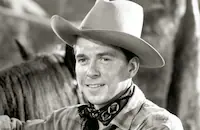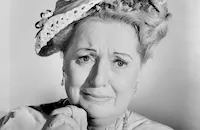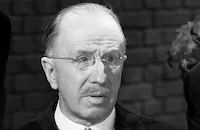Million Dollar Baby

Brief Synopsis
Cast & Crew
Curtis Bernhardt
Priscilla Lane
Jeffrey Lynn
Ronald Reagan
May Robson
Lee Patrick
Film Details
Technical Specs

Synopsis
When wealthy, aging Cornelia Wheelwright learns from young lawyer James Amory that her father defrauded his former partner, Fortune McAllister, of $700,000, she leaves her Swiss home and returns to the United States, determined to right her father's wrong by giving one million dollars to Pamela McAllister, Fortune's sole living descendant. In order to learn what kind of woman Pam is, Cornelia, using the name Miss White, takes a room in Pam's boardinghouse. The other occupants include Dr. Patterson, who wants a job in a laboratory; Josie La Rue, an exotic dancer; young Alvie Grayson and his mother; Mrs. Galloway, the landlady; and Peter Rowan, an aspiring composer, who is also Pam's boyfriend. Pam, a salesgirl at Lacey's Department Store, is a vivacious young woman, and she and Cornelia take an immediate liking to each other. The following day, Jim, acting on Cornelia's behalf, tries to present Pam with a cashier's check for a million dollars, but Pam assumes that he is merely trying to flirt with her and does her best to avoid him. After several more futile efforts to deliver the money, Jim finally succeeds, and the stunned Pam marches straight to the bank in order to see the money first hand. She then goes on a spending spree, buying presents for everyone and a piano for Peter. To Pam's surprise, Peter is not very happy about her windfall. Peter's sullen attitude confirms Cornelia's feelings that he is not good enough for Pam, and she encourages Jim to court her. Later that evening, after Peter and Pam quarrel because she wants him to quit his job, Jim takes Pam out for a night on the town. When a tipsy Pam returns home, she learns that Peter has taken a job with a band and is leaving town. She excitedly plans to go with him, but Peter tells her that they will not be happy together until he is successful. Pam is surprised to learn that her money has come between her and her friends, and when the Internal Revenue Service claims a large amount in taxes, she demands that Jim reveal the name of her benefactor. Jim conveys her to the Wheelwright mansion, where Cornelia is preparing to return to Europe. At first Cornelia is furious, but when she hears how unhappy Pam is, she decides to stay and teach her how to enjoy her money. Several months later, at a ball to introduce Pam to society, Jim proposes, but Pam is still in love with Peter and turns him down. Hoping to lure Peter home, she underwrites a performance of his symphony. Peter is devastated when the work is badly received by the audience and is angry that Pam paid for the performance. Things improve slightly when Flo, the band's singer, tells him that, unknown to Peter, she showed his lighter compositions to a publisher, who bought them all. Peter returns to his job with the band, and Pam realizes that because of her wealth, she may lose him. She withdraws all her money from the bank and gives it away to friends and strangers. At Grand Central Station, she reunites with Peter, announcing to Cornelia and Jim, who have followed her, that she and Peter will marry and travel with the band. Having met people like Peter and Pam, who are determined to succeed on their own, Cornelia tells Jim that she has finally discovered what America is really like.

Director

Curtis Bernhardt
Cast

Priscilla Lane

Jeffrey Lynn

Ronald Reagan

May Robson

Lee Patrick

Helen Westley

George Barbier
Nan Wynn

John Qualen

Walter Catlett

Fay Helm

Richard Carle

John Ridgely

Maris Wrixon

James Burke

Charles Halton

John[ny] Sheffield
George Humbert
Greta Meyer
Jean Ames

Charles Drake
Peter Ashley
George Davis
Ed Gargan
Dorothy Vaughan
Douglas Wood

Arthur Hoyt
Charles Sullivan
Donald Kerr
Jack Kenney

Irving Bacon
Edgar Edwards

Nella Walker
Garland Smith
Will Morgan
Pedro De Cordoba
William Forrest
Ted Thompson
Gaylord Pendleton
Tony Hughes
David Oliver
David Clarke
Herbert Vigran

Frank Otto
Billy Wayne
Kenneth Harlan
Charles Marsh
Garrett Craig
George Campeau
Inez Gay
Jean Maddox
Paulette Evans
Eddie Graham
Jack Wise
Stuart Holmes
Nat Carr
Vera Lewis
Georgie Cooper
Peggy Diggins
Mary Brodel
Crew
Frédéric Chopin
Hugh Cummings
Mort Dixon
Rudi Fehr
Leo F. Forbstein
Robert Haas
Chuck Hansen
Frederick Hollander
Frederick Hollander
Charles Lang
David Lewis
Richard Macaulay
Orry-kelly
Casey Robinson
Billy Rose
Charles Rosher
Leonard Spigelgass
Jerry Wald
Harry Warren
Perc Westmore

Film Details
Technical Specs

Articles
Million Dollar Baby
Ronald Reagan returned to his home studio Warner Bros. to make Million Dollar Baby after being loaned out to MGM for his previous film, The Bad Man (1941). According to his 1965 autobiography Where's the Rest of Me?, Reagan enjoyed making Million Dollar Baby, especially working with Priscilla Lane and May Robson. The most challenging part of his role as a classical pianist, he recounts, was learning how to believably mimic the moves of a real piano player. "For two weeks I went to the music department every day and spent hours at a dummy piano, following the hand movements of a pianist at a real piano playing Chopin, and all the music the picture called for," he says. "A lot of acting is imitation anyway, and I became pretty good as long as the piano remained silent. For a while there I almost convinced myself I could play."
Million Dollar Baby is a formulaic but pleasant romantic comedy which showcases the young Ronald Reagan in one of his more appealing performances and also provides a delightful character part for May Robson.
Director: Curtis Bernhardt
Screenplay: Casey Robinson, Richard Macaulay, Jerry Wald; Leonard Spigelgass (story "Miss Wheelwright Discovers America")
Cinematography: Charles Rosher
Art Direction: Robert Haas
Music: Frederick Hollander
Film Editing: Rudi Fehr
Cast: Priscilla Lane (Pamela 'Pam' McAllister), Jeffrey Lynn (James 'Jim'/ 'Jimmy' Amory), Ronald Reagan (Peter 'Pete' Rowan), May Robson (Cornelia Wheelwright aka Miss White), Lee Patrick (Josie 'Lou' La Rue), Helen Westley (Mrs. Galloway, Landlady).
BW-101m. Closed Captioning.
by Andrea Passafiume

Million Dollar Baby
Ronald Reagan, 1911-2004 - TCM Remembers Ronald Reagan
Ronald Reagan, the actor turned elected official whose fascinating career saw him develop as a contract player for Warner Brothers studios, to a politician who fulfilled his ambitions by becoming the 40th President of the United States, died at his home in Los Angeles on June 5 after a long battle with Alzheimer's disease. He was 93.
He was born Ronald Wilson Reagan on February 6, 1911 in Tampico, Illinois to John and Nelle Reagan. When Reagan was nine, his family settled down in the small community of Dixon, about 100 miles west of Chicago. After high school, Reagan enrolled in Eureka College, a small Christian school near Peoria. He graduated in 1932 with a degree in Economics, and pursued a career in broadcasting. His first gig was as a part-time announcer at WOC in Davenport, Iowa. Within a year, WOC had merged with its big-sister station, WHO in Des Moines, and Reagan was hired as a sports announcer.
In the spring of 1937, Reagan drove to Southern California to catch the Chicago Cubs in spring training on Santa Catalina Island. While he was in California, he wrangled a screen test and signed a contract for $200 a week with Warner Brothers. His film debut was rather inauspicious; he portrayed a radio announcer in an innocuous comedy Love is on the Air (1937). He made a few more "B" programmers like Hollywood Hotel (also 1937), and Girls on Probation (1938), before getting his first prominent role opposite Bette Davis in the popular tearjerker, Dark Victory (1939).
Although he seldom got credit for being a good actor, there was no denying that Reagan held his own given the right material: Knute Rockne, All American as the doomed Notre Dame football hero George "The Gipper" Gipp, where he delivered the film's immortal line "Win one for the Gipper!"; Santa Fe Trail in which he ably supports Errol Flynn in one of the boxoffice hits of its era (both 1940); Kings Row (1941), featuring one of his finest performances as a small-town playboy whose legs are amputated by a careless surgeon; and Desperate Journey (1942) where he again supported Flynn in an exciting action picture.
Due to his poor eyesight, Reagan didn't see any action in World War II, so the studio heads assigned him to star in a series of patriotic films produced by the First Motion Picture Unit of the Army Air Forces in Culver City. Between 1942-45, Reagan starred in over 400 of these films. After the war, Reagan still found some good roles: The Voice of the Turtle (1947) proved he had a deft hand at light comedy opposite Eleanor Parker; The Hasty Heart (1949) offered another underrated performance as he ably portrayed the Yank in John Patrick's much heralded wartime play; and Storm Warning (1950) was a slick melodrama that cast Reagan as a crusading District Attorney determined to bring the KKK in a small southern town, with the help of Doris Day and Ginger Rogers!
It was around this time that Reagan became involved in politics. In 1947, he began a five-year term as president of the Screen Actors Guild (SAG), and testified in October of that year before the newly formed House Un-American Activities Committee (HUAC). He identified suspected Communists Larry Parks, Howard Da Silva and Alexander Knox, all of whom were subsequently called to testify, and subsequently blacklisted. Later records showed Reagan was so concerned about the Communist influence in Hollywood, that he became an FBI informer.
As Reagan became steeped in his political career, his parts throughout the '50s became inferior: the notorious Bedtime for Bonzo (1951); the coy "sex" comedy She's Working Her Way Through College (1952) that cast him as a college professor who romances a stripper! (Virginia Mayo); Cattle Queen of Montana (1955), a sluggish Western that even the redoubtable Barbara Stanwyck couldn't save; and finally Hellcats of the Navy (1957), a stodgy war picture that would be his only film that co-starred his wife Nancy (Davis).
Television offered some salvation. For eight years, (1954-62), Reagan served as the host of General Electric Theater, a televised series of dramas. He also found a niche as GE's goodwill ambassador to employees and to civic and business groups around the country, furthering his taste and honing his craft as a public official. By the mid '60s, Reagan would move into politics entirely, save for one last film, the thrilling The Killers (1964), Reagan's only known villainous role, as a murderous gangster. That same year, he actively campaigned for Republican Presidential candidate Barry Goldwater, although Goldwater lost to Lyndon B. Johnson.
Reagan whose profile was riding high, had cemented his future as a successful politician. In 1966, he ran against incumbent Governor Pat Brown for the state of California and won, serving successfully for two terms until 1974.
Reagan began an all-out, two-year drive to wrest the 1976 nomination from incumbent Gerald R. Ford, an appointed vice president who became president on the resignation of Nixon. Reagan fell short by a handful of delegates to the Republican national convention. But Ford lost to Jimmy Carter, and Reagan became the front-runner to challenge Carter in 1980. After defeating Carter, Reagan held two terms as President of the United States (1981-89). After his second term was over, he retired quietly in California. In 1994, it was revealed to the media that Reagan was suffering from Alzheimer's disease; he had been kept out of the public eye since then.
He was married briefly to actress Jane Wyman (1940-48), and had two children; a daughter Maureen and an adopted son, Michael. In 1952, he married a budding film starlet, Nancy Davis, who bore him two more children; a daughter, Patty; and a son, Ronald Jr. Ronald Reagan is survived by Nancy, Michael, Patty and Ron Jr. His daughter Maureen died of Melanoma in 2001 at the age of 60.
by Michael T. Toole
Ronald Reagan, 1911-2004 - TCM Remembers Ronald Reagan
Quotes
Trivia
Notes
A working title of the film was Miss Wheelwright Discovers America. The song "I Found a Million Dollar Baby" was woven into the score after the title was changed. The Variety review states that Leonard Spigelgass' original story "Caused quite a flurry in story departments a year or so ago...." According to news items in Hollywood Reporter, Irene Dunne was considered for the role of "Pam." Ann Sheridan was originally cast as Pam and was then replaced by Olivia De Havilland during Sheridan's salary dispute with the studio. De Havilland was later replaced by Priscilla Lane.

Miscellaneous Notes
b&w














